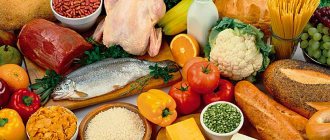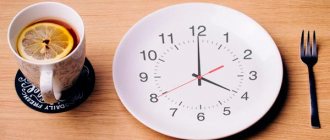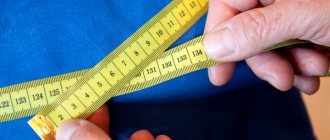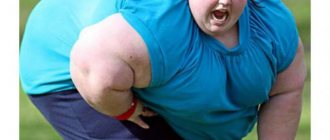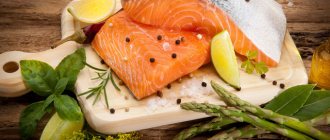Dietetics - the science of rational nutrition - for many years was considered an auxiliary branch of medicine, adjacent to such areas as gastroenterology, endocrinology, cardiology, etc. Today, dietetics is an independent discipline, inextricably linked with the concept of “healthy lifestyle”.
Eating regularly is as natural for a person as breathing. And the length and quality of life depend on how rational and balanced the diet is. However, not everyone is good at taking care of their health. Poor eating behavior, coupled with stress, physical inactivity, and bad habits can lead to weakened immunity, decreased productivity, and increased susceptibility to disease. A timely meeting with a nutritionist will help prevent serious consequences!
Highly qualified nutritionists at MedicCity, who have related specialties, will help you choose the optimal diet, taking into account the age and characteristics of the patient’s body.
1 Dietetics in MedicCity

2 Dietetics in MedicCity

3 Dietetics in MedicCity
Vegetarian diet and diabetes
A vegetarian diet for diabetes should not contain too many carbohydrates.
A vegetarian diet can be beneficial for most diabetics. But the fact that, due to the lack of meat, it often contains more calories from carbohydrates than protein, this can be a potential problem for people with diabetes. Therefore, if we do not pay attention to what we eat, we risk easily reaching a state of hyperglycemia.
However, if alternative protein sources are chosen appropriately, elevated blood sugar levels can be avoided.

Dietetics and weight deficiency
Sometimes the weight problem is not extra pounds, but a significant lack of them. It is no easier for a thin person to gain weight than for a fat person to lose weight.
If you are underweight, a thorough examination is also necessary. After all, a variety of reasons can lead to lack of weight, for example, gastroenterological, psycho-emotional or hormonal.
The MedicCity clinic uses an integrated approach to treatment, so if necessary, the patient will receive assistance from a gastroenterologist, endocrinologist, psychotherapist and other specialized specialists.
Correct diagnosis, individual selection of diet, and correction of the diet throughout its entire duration will help the patient not only normalize weight, but also improve life in general.
Types of vegetarian diet
There are several types of vegetarian diets. The most common are:
- A strict vegetarian diet means avoiding all animal products.
- The lacto vegetarian diet - also known as the lacto-vegetarian diet - people who follow it eat eggs and dairy products as well.
- Vegetarian diet "Pesco". Adherents of this diet are called Pesco-vegetarians and Pesco-vegans - in this case, fish is also allowed to be eaten.
- A semi-vegetarian diet suggests that people eat foods of plant origin, while sometimes allowing themselves meat.
Weekly menu from a nutritionist

To make it easier for you to create a menu for every day, we will give an example, developed on the advice of a nutritionist and helping to lose weight. Take it as a model and gradually supplement it with healthy light dishes.
Monday
- Oatmeal with a spoonful of jam, unsweetened tea;
- Banana baby puree 200g;
- Creamy soup with champignons, chicken fillet + cabbage salad with tomatoes and radishes;
- A pack of low-fat cottage cheese, an orange;
- Curdled milk.
Tuesday
- Buckwheat steamed with boiling water in the evening + steamed vegetables, dried fruit compote;
- Two green apples;
- Cold borscht, steamed veal + chopped fresh vegetables;
- Large cod steak baked in foil, grapefruit;
- Kefir 1.5%.
Wednesday
- Rice + vegetable stew;
- Dessert of 50g walnuts with a spoon of honey;
- Sorrel cabbage soup, boiled turkey + 3 baked potatoes + fresh cucumber;
- Two boiled eggs + cheese sandwich;
- A large glass of natural yogurt.
Thursday
- Durum wheat spaghetti mixed with 100 g of low-fat cottage cheese;
- Banana + a slice of dark chocolate;
- Meat broth with croutons, steamed beef + stewed cabbage;
- 200 g sea cocktail;
- A mug of baked milk with honey.
Friday
- Lentils with boiled fish;
- Two peaches or banana;
- Ukha, a large bowl of vegetable salad dressed with sour cream;
- Grilled chicken fillet, fresh cucumber salad and tomato;
- Omelette of 2 eggs, sprinkled with herbs, a glass of kefir.
Saturday
- Boiled potatoes + grated carrots with garlic;
- Three small kiwis;
- Milk soup, rabbit stewed in a slow cooker with green beans;
- A pack of cottage cheese + a spoonful of fruit jam;
- Curdled milk.
Sunday
- Cauliflower stewed in a frying pan with onions;
- Fruit salad with yogurt dressing;
- Vegetable soup, boiled veal + beans with tomato sauce;
- 150 g low-fat cheese;
- Half a liter of kefir.
Health Benefits of a Protein Diet
Most often, people who follow vegetarian diets are considered to lead a healthy lifestyle. Perhaps, in fact, this is true. However, if you are on the wrong diet, consuming a lot of foods with harmful food additives E, these foods can become harmful to you. This occurs if you eat excessive amounts of processed foods (veggie burgers, dried pork chops, or other prepared foods).
Therefore, it is important to follow the basic rules so that your food intake is actually properly balanced. It should be noted that research shows that vegetarians have statistically lower body weight and a consistently lower body mass index than meat eaters. In addition, they live longer and suffer less from the diseases of civilization.
What is included in the complex
- Clinical blood test with leukocyte count and ESR (with microscopy of a blood smear to detect pathological changes) (venous blood)
- Total protein
- Cholesterol-VLDL (including triglycerides)
- Atherogenic index (total cholesterol, HDL)
- Glucose (fluoride)
- Glycated hemoglobin (HbA1c)
- Alanine aminotransferase (ALT)
- Aspartate aminotransferase (AST)
- Total bilirubin
- Creatinine
- Urea
- C-reactive protein
- Uric acid
- LDL cholesterol
- Insulin
- T4 free
- TSH
Proper nutrition regimen
Types of eating disorders that occur in 60% of overweight people:
- Food for company. For example, a woman had dinner at five o'clock. My husband came at nine in the evening. The wife eats the second dinner for company.
- Emotional “food drunkenness”. Eating stress, replacing love with a tasty product. Sugar stimulates morphine zones in our brain, the same as drugs. The hand, like that of a drug addict and alcoholic, reaches out to this pleasure. There is no need to read books, go to the theater, play sports, build relationships, or look for sources of joy. He took it and ate it. You love yourself for a minute, then you hate yourself the whole evening.
- Restrictive disorders – “dietary depression”. It occurs in people who are constantly on diets, limit themselves, and go to bed thinking about food. Such people cannot stop once they get their hands on the goodies. In practice, it turns out to be a painful attempt to lose weight in order to eat cakes and buns. The habit of proper eating behavior is not developed.
- Paroxysmal disorders. For example, "night priestess". A one-time uncontrollable bout of overeating. Suddenly I wanted it - I attacked the food and was no longer able to stop.
Regarding night meals: the guideline should be an average of 3 hours before bedtime. This doesn't mean that if you go to bed at 1 am, you can eat at 10 pm. It is necessary to start from the time when the average person should go to bed. That is, 11 - 3 = 8. Ideally, the latest meal is 8 pm.
Everything in life is far from an ideal situation. Compromises must be sought. For example, leave free calories for a glass of kefir or something protein. Even if you are not sleeping, your body is already sleeping. By eating unscheduled meals, we give him double the load, creating stress.
Excess weight leads to a lot of problems. You can often hear the phrase “I don’t have money for a diet.” Having excess weight requires a lot more money and investment in yourself - at the moment and in the future for 10-20 years. All this against the backdrop of psychological discomfort and decreased quality of life.
You need to drink 30-40 ml of water per 1 kilogram of body weight. But no more than 3 liters per day.
In the morning we woke up, got up, and drank 1-2 glasses of water on an empty stomach. And it's better with
, maybe with lemon, maybe with
. Then a glass of water before each meal. 5 meals – 1 liter already available. It is advisable not to drink water during meals and for at least 40 minutes after, otherwise the efficiency of digestion and absorption of food will decrease.
What does "water" refer to?
- Water with lemon.
- Water with Coral Calcium.
- Decoctions and infusions of herbs.
- Fruit drinks without sugar.
- Green tea for the second and subsequent brews.
Coffee and black tea are not included here.
Shakes and protein products work great. But if you eat them in the evening, there will be no result. Eating regimen is important. Ideally, this is 3 main meals and 2 snacks. Snacks help you avoid overeating at main meals.
Recommendation: alternate dinner with a snack. That is, at four o'clock in the afternoon, have a hearty meal, and in the evening - a light snack.
A balanced breakfast with protein is required: porridge with an egg, with a piece of cheese. How to eat to lose weight: small, regularly. Last meal no later than 3-4 hours before bedtime.
What should it be like? Lots of plant foods and a minimum of simple carbohydrates? Chicken breast and buckwheat? Fasting days and other ways to cleanse the body that only injure it? The best option looks like this:
- Foods with a high glycemic level are excluded - products made from white refined flour, all kinds of sweets, fried meat, fast food, which has long been recognized as one of the main enemies of our figure.
- The list of what is allowed is extensive. It included chicken, turkey, rabbit and other lean meats, including beef, durum wheat pasta, vegetables and fruits, cereals and whole grain bread. You can even have chocolate, but under one condition - it will be bitter (with a cocoa bean content of at least 70%).
- You should eat 4-5 times a day. Between the three main meals - snacks. They should be right - light and satisfying. We recommend choosing fruits and vegetables that are high in fiber. It is practically not absorbed by our body, but creates a long-lasting feeling of fullness, swelling in the stomach and filling it. In addition, coarse fibers excellently cope with their main task - cleansing the intestines, eliminating waste and toxins.
- The diet should be balanced. It must contain all the necessary nutrients: proteins (meat, eggs), fats (fish, avocados, vegetable oils), carbohydrates (plant foods, cereals, bran, whole grain bread).
- Another advice from a nutritionist for those who want to learn how to lose weight and lose weight correctly is to drink more water. We forget about the very concept of daily intake (1.5 -2 l), which leads to disruption of intestinal motility, dry skin, and insufficient absorption of essential substances obtained with food. By the way, a glass of warm water is an excellent remedy for hunger.
How to start eating right? After all, it’s not easy to move from permissiveness in food to strict order. Here are some tips from our nutritionist to help you get used to the new regime and new laws:
- Keep a food diary - in it you will record the calorie content of all the dishes you ate during the day. This is convenient and useful - you see for yourself what leads to weight gain or loss, and help the specialist working with you find the cause of weight gain and build the right strategy to combat extra pounds.
- Forget about processed foods and cook yourself. This will help you fall in love with healthy foods and understand how varied and tasty low-calorie dishes can be, including not only all kinds of soups and cereals, but also homemade baked goods, jams, mousses, casseroles, and fruit salads. All this will be an excellent alternative to donuts and cakes, which slowly lead you to obesity.
- Teach your loved ones to eat healthy. This is difficult, but especially important for you. When surrounded by temptations, it is difficult to force yourself to eat healthy food. Tell your family and friends about this - if they want you to be happy and achieve your goal, they will help you avoid breakdowns and become support and support at all stages of the difficult process of losing excess weight.
Intermittent fasting
Don’t be intimidated by the name and imagine long days without food or water. In fact, this diet is based on short-term calorie restrictions, such as the 5/2 diet. For five days you eat as usual, and for 2 days you limit your diet to 500 calories. Of course, at normal times, overeating or abusing fast food is also not recommended, but such a schedule allows you to fit holidays, trips to cafes, alcohol and other not very healthy moments into your regime.
| Who is it suitable for? | For whom it is contraindicated |
| For those who are not ready to change their usual diet and for those who want to try something new | Children, teenagers, pregnant women, people with chronic diseases, elderly people |
Basic rules of intermittent diet:
- drink a lot of water, it will help you cope with hunger more easily;
- combine diet with physical activity;
- fill your “hungry” days with activities as much as possible so that there is no time left to think about food;
- Don’t try to stick to 500 calories right away, get used to fasting gradually.
